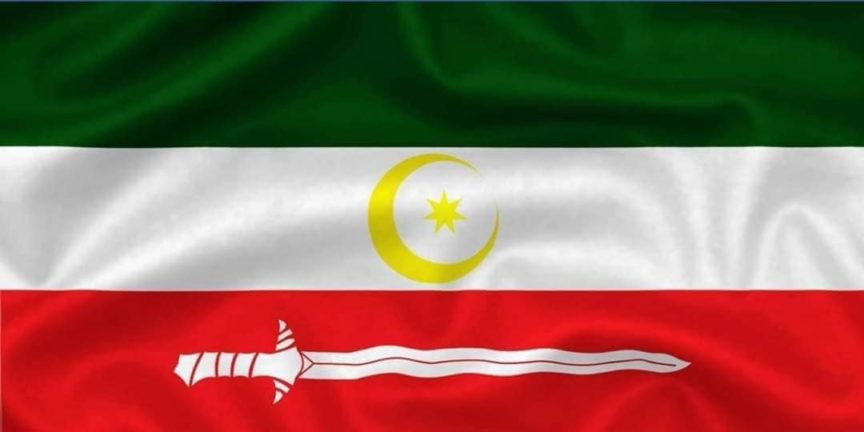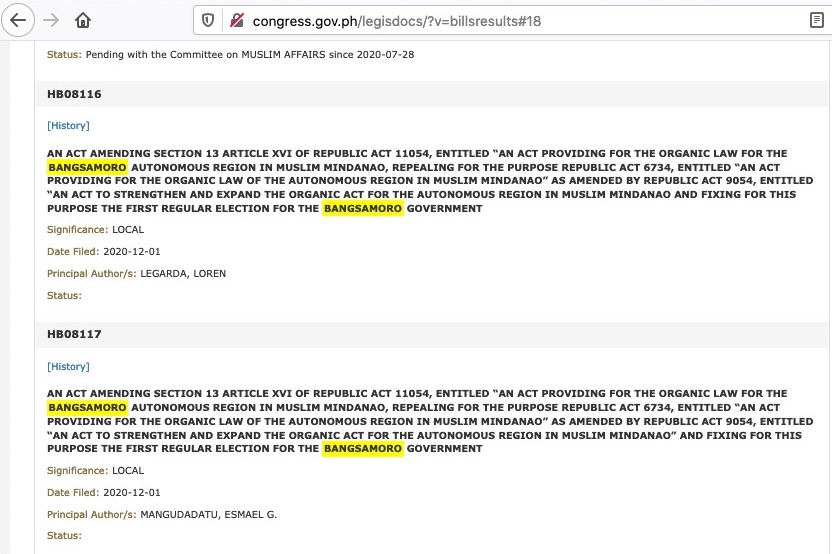DAVAO CITY (MindaNews / 03 December) – Representatives Esmael “Toto” Mangudadatu of the second district of Maguindanao and Loren Legarda of the lone district of Antique separately filed on Tuesday similar bills to extend the transition period in the Bangsamoro Autonomous Region in Muslim Mindanao (BARMM) by seeking to reset the first regular election in the region from May 9, 2022 to May 12, 2025.
Legarda filed House Bill (HB) 8116 while Mangudadatu filed HB 8117 on December 1.
Legarda’s explanatory note states that as the entire country continues to cope with the challenges caused by the COVID-19 pandemic, government priorities have shifted as the need to prioritize the delivery of health, education, economic, and social services to the people “has become even more apparent and urgent.”
 Flag of the Bangsamoro Autonomous Region in Muslim Mindanao.
Flag of the Bangsamoro Autonomous Region in Muslim Mindanao.
HB 8116 seeks to postpone the first regular election for the Bangsamoro Government to 2025 to allow the 80-member Bangsamoro Transition Authority (BTA), the body tasked to govern the BARMM during the transition period, to “attend to more urgent needs of the Bangsamoro people, while allowing them to strengthen the foundations for stronger regional government and economy.”
The postponement, she added, will also give “ample time for the full transition of the BARMM to take place, including the effective implementation of the programs and operations of the Bangsamoro Transition Authority.”
RA 11054 or the Organic Law for the BARMM, provides under Section 13 of Article XVI that the first regular election for the Bangsamoro Government “shall be held and synchronized with the 2022 national elections” or on May 9, 2022.
Bearing the same title, the Mangudadatu and Legarda bills seek to amend this section by changing the year of the first regular election of the Bangsamoro from 2022 to 2025. The May 2025 election is on May 12.
The histories of the two bills have been uploaded in the Legislative Documents section of the website of the House of Representatives but the full text of the bills have yet to be uploaded as of 5 p.m. on December 3.
 MindaNews was able to obtain a copy of the Legarda bill. Mangudadatu posted on his Facebook page on Wednesday afternoon a copy of the acknowledgment receipt from the House that his electronically filed bill was received at 6:43 p.m. on December 1 and was assigned the HB number 08117. Legarda’s bill was stamped received on December 1, the handwritten time at 3:48 or 5:48 p.m.
MindaNews was able to obtain a copy of the Legarda bill. Mangudadatu posted on his Facebook page on Wednesday afternoon a copy of the acknowledgment receipt from the House that his electronically filed bill was received at 6:43 p.m. on December 1 and was assigned the HB number 08117. Legarda’s bill was stamped received on December 1, the handwritten time at 3:48 or 5:48 p.m.
In his Facebook post on Wednesday, Mangudadatu said in Filipino, that the Special Committee on Peace, Reconciliation and Unity which he chairs, and the Office of the Presidential Adviser on the Peace Process (OPAPP) and the GRP-BTA Intergovernmental Relations Board (IGRB) “are united that our desired peace and progress in Muslim Mindanao will not be derailed by the lack of time to fully implement what had been agreed upon in the CAB” (Comprehensive Agreement on the Bangsamoro), the peace agreement signed by government and the Moro Islamic Liberation Front (MILF) on March 27, 2014.
Mangudadatu said HB8117 is a product of several committee hearings where they found there are tasks that have not been finished or cannot be delivered as yet by both the national government and the MILF-led BTA because of the many constraints and difficulties, exacerbated by COVID-19.
He said three years are not enough for the BTA and the national government to lay a strong foundation for peace in Mindanao and to establish a responsive and well-functioning Bangsamoro bureaucracy.
“Too short”
The Mangudadatu and Legarda bills were filed exactly a week after President Rodrigo Duterte and key Cabinet officers met in Davao City with Bangsamoro interim Chief Minister Ahod Balawag Ebrahim and his delegation to discuss the proposed extension of the transition period.
On December 3, Presidential Peace Adviser Carlito Galvez told the House’s Special Committee on Peace, Reconciliation and Unity chaired by Mangudadatu that President Duterte “believes that three years is too short and he agrees for the possible extension of the BTA up to five to six years.
On November 17, the interim Bangsamoro Parliament passed Resolution 93, urging the House of Representatives and the Senate to extend the transition period until June 30, 2025 to give the transition government “sufficient time to continue in performing its powers and functions and fulfill its mandate.”
Galvez told the House Committee that they are aware of the difficulties of the BARMM government in laying the ground for the foundation of the regional government.
He said the political and normalization tracks laid down under RA 11054, the enabling law of the peace agreement, have been affected by the COVID-19 pandemic.
The normalization track involves, among others, the decommissioning of weapons and 40,000 combatants of the MILF’s armed wing, the Bangsamoro Islamic Armed Forces; dismantling of private armed groups and re-deployment of the military. Of 40,000, only 12, 000 have been decommissioned and government has not completed its promise of one-million peso package for each of the decommissioned.
“The movement of the peace workers as well as international peace partners have been restricted” and “funds have been reduced since some of the resources were utilized for emergency purposes,” Galvez said.
He appealed to the “senses of those opposing the extension,” explaining that due to COVID-19, “the normalization program was stalled for more than two years.”
“If we want the transition to be successful, we need to give our Bangsamoro brothers and sisters ample time to lay the foundation. And realistically, we cannot achieve this in three years,” Galvez said.
Midterm review, roadmap
Basilan Rep. and Deputy House Speaker Mujiv Hataman said a midterm review of what has been done and not done during the first half of the transition period is needed as he also asked extension proponents to “present, in clear and attainable sets of goals, a roadmap of what they intend to accomplish if the transitory government is extended for another three years until 2025.”
“A blind extension would be counterproductive,” Hataman said in a statement on November 27, adding that without a midterm review to give them “the real picture, how can OPAPP (Office of the Presidential Adviser on the Peace Process) blindly suggest to extend the transition period for another three years? What is its basis? And why three years, and not two or five?”
Hataman said he will file a resolution in the House of Representatives asking the appropriate committee to conduct a midterm review, in aid of legislation, of the Bangsamoro transition. He told MindaNews on Saturday that he will file the resolution “next week.”
The Mindanao Peoples Caucus, a peace advocacy group that has been accompanying the Bangsamoro peace process since 2002, last month presented the results of its midterm review of the Bangsamoro transition, where extension of the transition period was among the recommendations of those who participated in focus group discussions and key informant interviews.
The peace agreement provides for a third party monitoring team (TPMT) composed of representatives from international bodies and domestic groups “to monitor the implementation of all agreements” until the Exit Agreement is signed.
The five-member TPMT, two of them nominated by the government, two by the MILF and a jointly nominated chair, is expected to release its sixth public report next month. Its fifth public report, released on April 23, 2019, covered the period July 2107 to February 2019.
The BARMM, which comprises the provinces of Maguindanao, Lanao del Sur, Basilan, Sulu and Tawi-tawi and the cities of Marawi, Lamitan and Cotabato, and 63 villages in North Cotabato, was inaugurated on March 29, 2019. Supervision over Cotabato City will be transferred from the Department of Interior and Local Government to the Bangsamoro Ministry of Interior and Local Government on December 15.
Hataman told MindaNews on Thursday that he has drafted the resolution but will await copies of the reports from the Bangsamoro government and the TPMT (Carolyn O. Arguillas / MindaNews)
